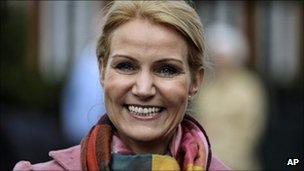Profile: Danish PM-elect Helle Thorning-Schmidt
- Published

The leader of Denmark's Social Democrat party, Helle Thorning-Schmidt, is expected to become the country's first female prime minister after a narrow election victory.
Her four-party coalition took 89 seats in Denmark's 179-seat parliament, bringing an end to 10 years of centre-right rule.
"Make no mistake, today we've written history," she told her supporters as she declared victory.
Mrs Thorning-Schmidt, born in 1966, has a degree in political science from the University in Copenhagen and has also studied at the European College in Bruges, an experience she said changed her life. She worked for a time as a consultant for the Danish Confederation of Trade Unions (LO).
After serving one term as an MEP between 1999 and 2004, she was elected head of the Social Democrats in 2005. However her first years were marred by a disastrous defeat in the 2007 polls which led her to conclude Danes "need more time before they hand over responsibility to us".
For the 2011 poll, Mrs Thorning-Schmidt campaigned on a platform of tax rises and increased public spending, as Denmark battles its worst downturn since World War II. But she has insisted she will not "jump on the austerity wagon" with other countries in Europe and will protect the welfare system.
She has proposed making everyone work for 12 minutes longer each day, creating an extra hour of productivity each week which her party argues would help kick-start growth.
Critics, including incumbent Prime Minister Lars Lokke Rasmussen, dismissed this as creating "12 minutes' money" rather than "real money".
Immigration has also been a key issue, with Mrs Thorning-Schmidt proposing a more humane policy to replace the current restrictive rules introduced by the outgoing government and its main ally, the right-wing Danish People's Party (DPP).
'Gucci Helle'
Analysts say little has been made of Mrs Thorning-Schmidt's gender during the election campaign and she is not expected to use her post to make any significant changes to the country's already well-advanced equality laws.
In a recent TV interview, she said being elected would have little effect, except perhaps for encouraging young girls to think "hmm, this is a post I can aspire to".
However, the Information newspaper described her win as a "victory for women" which should be seen as "an important step for gender equality - not least on the symbolic level".
While her gender may not have been hugely significant in the campaign, her stylish appearance and taste for designer clothes have come under fire as being inappropriate for the leader of a traditional workers' party, earning her the nickname Gucci Helle.
The day after the election, the Politiken newspaper said she had won despite being "too well-dressed for the Social Democrats, too fresh to become the head of the country, too cool to win people's hearts".
Similar criticism has also been aimed at her from party members.
She responded to a heckler at one party meeting: "We can't all look like shit."
Mrs Thorning-Schmidt met her husband Stephen Kinnock while studying in Belgium. He is the son of British Labour Party politicians Neil and Glenys Kinnock and is now director of the World Economic Forum (WEF). They married in 1996 and have two daughters.
However their unconventional living arrangements - she lives in Copenhagen with their children while he is based in Switzerland - have led to criticism in the media.
The couple were also investigated last year over allegations they were avoiding paying tax by declaring Mr Kinnock a non-resident.
Mrs Thorning-Schmidt said she had made "a big and sloppy error" in her estimation of how often her husband was out of the country, but the couple were cleared of wrongdoing.
- Published16 September 2011
- Published3 August 2010
- Published16 September 2011